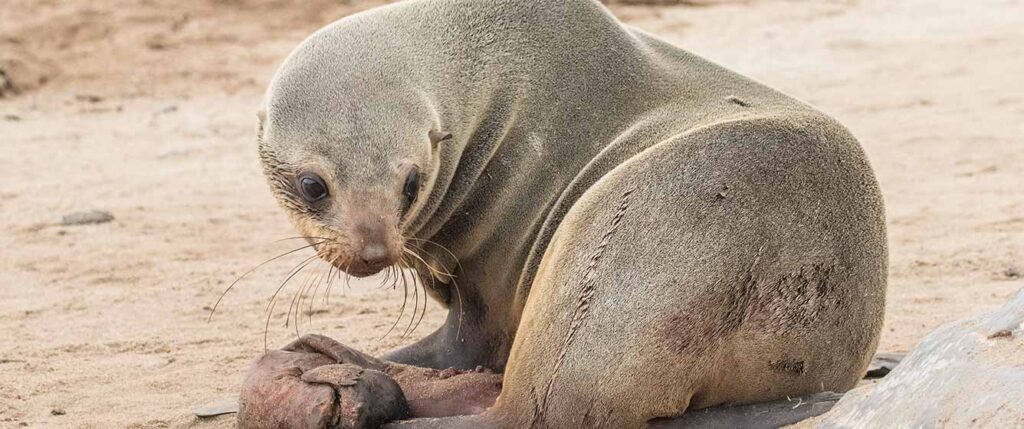Conservation groups are shocked over the harrowing discovery of an estimated 7,000 dead Cape fur seals found along the Namibian coastline, many of them premature pups.
According to startling reports, the grim tally of dead seals washed ashore at the sandy beaches of the Pelican Point peninsula near Walvis Bay has skyrocketed in recent weeks – and now the race is on to find out why.
Pelican Point, a popular tourist destination known for its flourishing breeding colony of seals and school of dolphins, is home to about 50,000 Cape Fur seals. Every year in November and December, the area welcomes the birth of thousands of new pups.
In September this year, conservationists began noticing dead seals near Walvis Bay. Early in October, they dispatched drones to survey the area and to their horror they spotted large numbers (between 5,000 and 7,000) of seal fetuses at the colony, a result of adult female seals miscarrying.
As investigations have mainly centered on Pelican Point Beach, it’s feared that the overall number of dead seals could be even higher.
WHAT IS CAUSING THE SEAL DIE-OFF IN NAMIBIA?
Besides the number of dead pups, there has been a spike in the number of dead female adults found among the corpses. While the cause of the mass die-off is yet to be established, it has been speculated that the seals could have starved to death as some of the dead females were described by Tess Gridley from the Namibian Dolphin Project as “thin-looking, emaciated, with very little fat reserves”.
At the time of going to press, the Namibian Ministry of Fisheries and Marine Resources confirmed that samples taken from the dead seals would be sent to South Africa to determine the cause of death.
Fish is the main diet of seals and if fish populations had dwindled in the area, or redistributed to other areas, it could have resulted in a dire shortage of food.
In addition to being detrimental to their own health, if the nutritional requirements of nursing mothers are not met, they cannot suckle their young properly. When there is a shortage of food, female seals will often abandon their young or abort their unborn babies.
Scientists are also looking at toxins in the environment or disease as possible causes.
This is not the first time a mass die-off of seals has occurred in Namibia. Twenty-six years ago, about 10,000 seals died and 15,000 fetuses were aborted in a mass die-off that was finally linked to not only starvation but also a bacterial infection.
“While it’s important to note that some dead pups are usually found this time of year, this season’s deaths have been exceptionally higher than normal,” said David Barritt of Network for Animals (NFA).
“Taking into consideration that we have only just entered the month of November, it’s incredibly worrying that the current numbers of dead seals are so high – and that this number may not even be a true reflection of just how many have died thus far.”

